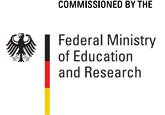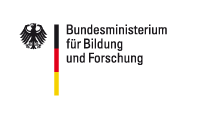The German Federal Ministry for Education and Research (BMBF) and the National Technological Innovation Authority of the State of Israel aim to pursue their innovation dialogue and agreed on a joint R&D Programme.
1. Funding purpose-form of Cooperation
The goals of the collaboration are: a) to improve the competitiveness and extroversion of of their respective research entities and the quality of life, b) to strengthen the links between research and industry and encourage the private sector to invest in R&D activities, c) to strengthen research capacities and specialisation, and d) to strengthen technology transfer from research into industry especially into Start-up companies and small and medium sized enterprises (SME).
The R&D Programme has the following specific objectives:
- To focus efforts and available resources on thematic research fields in the area of applied nanotechnology, which are of major interest to both countries and important to society and the economy.
- To promote the development of specialised scientific personnel, of R&D excellence and the development of products/services to be competitive worldwide.
- To develop new knowledge –including new technologies– or joint research resources in order to improve competitiveness and address significant social and environmental needs.
- To financially support joint projects seeking to achieve specific results which in turn are used to develop or improve products, processes, services or policies, with the active involvement of the Israeli and German production sector.
- To strenghthen the German Israeli research collaboration and to extend the established funding scheme to the aspect of applied research.
Therefore, joint activities should focus on the following form of cooperation:
Implementation of joint R&D projects for the research organizations and enterprises of both countries, in science, technology development and transfer, aiming at improving the competitiveness and innovation potential of research entities and leading to innovative products/procedures of high added value or to push new technologies into tradidional industries. Nanotechnology as a key technology can be used in a broad range of applications.
The deadline for the submission of pre-proposals is February 28, 2017.
The approval of full proposals is intended six month later (August 30, 2017).
2. Potential applicants - Composition of consortia
The Program is addressed both to private and public sectors of both countries. Bilateral cooperation shall comprise teams consisting of, at least, one research group from higher education institutions, research institutes/centres and one private enterprise from each of the two countries. A simple clustering of only national projects is not eligible. Only applicants from Germany and Israel are eligible for funding. Partners (private enterprises and/or research institutes/universities) from other countries may also participate, but no funding is foreseen for their participation by BMBF and the National Technological Innovation Authority in the framework of this call for proposals.
The funding institutions anticipate that the transnational research collaborations covered by the scope of this cooperative research funding will deliver significant synergy effects within the framework of the research projects to be funded.
3. Priority Research Fields
The research fields of the present call should focus on the following specific domains in the field of applied nanotechnology which are of interest for both countries (indicative):
- Resource-efficient production technologies by developing techniques for functional surfaces and coating systems also using the potentials of novel materials: New manufacturing processes for the design, production and measurement of locally functional surfaces and structured layers which significantly improve the use of resources; new production equipment for generating locally functional surfaces.
- Solutions for new production modules that enhance resource-efficiency in the production of locally functional surfaces considerably.
- Nanomaterials (focused on graphene, graphene related materials (e.g. carbon nano-tubes, chalcogenide materials) for industrial applications).
- Nano-based energy resources, batteries, photovoltaic cells and others.
- Photonics – industry-led projects in the field of integrated micro-photonics for applications in metrology, sensing and imaging and biophotonics.
- Nano devices for sensors [electric, magnetic, motion]. The microelectronic projects will be funded within the existing cooperation with Israel via Eureka-Cluster Penta.
- Bio-medical technologies: medical, biological, lab-on-a-chip, single cells, single molecules, low-quantity tests, high-throughput methods, cell sorting technologies, 3-D imaging and diagnostics based on microfluidics.
- Nano-related methods for neuron cells and other tissue types (growth and development).
- Nano-particles and nano-structures for drug-delivery, pathogen technologies, disease prevention, infection prevention.
4. Object of funding – Common requirements
The main focus of the funding cooperation is on research and development (R&D) projects that:
- demonstrate an interdisciplinary and/or transdisciplinary approach;
- make a contribution to the improvement of research collaboration between the partner countries;
- correspond to the funding purpose described.
The projects submitted for funding under this call should have an obvious advantage and added value resulting from the mutual cooperation of the partners. Proposals must be clear in scope, demonstrate the contribution of the participants from both countries and stress out the benefit provided by the joint collaboration. Further more they must be balanced between participants and targeted to increase knowledge base, excellence, technology transfer and promote access to R&D infrastructures.
Precondition for eligibility is balance in number of partners and financial contribution from both countries, Israel and Germany.
Only joint proposals accordingly submitted will be taken into consideration.
5. Evaluation Procedure – Selection criteria
Both countries will carry out expert’s evaluation of the jointly submitted R&D proposals according to the following common selection criteria:
- The quality of science and contribution in the competitiveness and innovation potential of the research project. Novelty, originality and coherence to the key themes, additionally a clear focus on solutions to problems.
- Expected sustainability effects (qualitative and, where possible, quantitative) with regard to the partnership.
- Technical, economic and scientific implementation potential of the anticipated research results. Opportunity/risk assessment covering long term implementation and usefulness. Actuality and priority of the task, contribution to a problem-solving and demand-orientated strategy, aimed target group.
- Expertise of project partners.
- Collaboration between scientific partners and enterprises. Justification of collaboration reasons among the partners and description of the expected benefits, as well as reference to the added value which will be created through this collaboration. Projects that do not prove the scope of this cooperation cannot be considered.
- Significance of the utilisation/business plan with respect to the application of the expected outcomes.
- Possible ways for the exploitation, protection (of IPR) and dissemination of the project results.
Successful proposals will be finally approved by the joint committee comprising of selected members from the funding organizations of both countries.
6. Financing - Type of funding and legal basis
Funding support will be given to each partner by its own Implementing Organization (BMBF in Germany and National Technological Innovation Authority in Israel) in accordance with the national laws, rules, regulations and procedures in effect. Proposals submitted by the Israeli partners are funded depending on the category of research, the size of the enterprise and the type of collaborating organizations, in compliance with the EC regulations. Both countries have agreed to earmark a total budget for the call up to 5Mio. Euro. The total budget per project by each side covering up to three years of the project will not exceed 1 Mio. Euro. The participation at the overall project costs should be the about same for each country. Both sides will make their decision after due assessment of the circumstances within the scope of the budget funds available. There is no legal entitlement to funding.
The duration of the projects should not exceed three years. The partners have to submit an annual report of the project progress according to the original approved proposal in English and an updated program for the coming year to their national agencies.
7. Application procedure
Proposals should be submitted to both parts within the said deadline in electronic form. Potential applicants will be invited to submit their joint application through the available e-platforms for the bilateral cooperation in Israel and Germany. However, they are advised to contact the national contact points before writing their proposals to carefully check the specific national application and funding conditions. The respective contact points are:
- in Germany:
DLR Project Management Agency
Heinrich-Konen Str. 1
53227 Bonn - in Israel:
National Technological Innovation Authority
Infrastructure Technology Division
29 Hamered St.
Tel Aviv 61500
There is a two-level procedure for the proposal submission. The proposals shall comprise a common project description / project outline in English and further national formal and financial information.
For formal and financial national regulations please see the national calls and guidelines:
- for German applicants: https://www.bmbf.de/foerderungen
- for Israeli applicants: www.magnet.org.il
First phase [pre proposal]:
The common project description / project outline should be prepared in Arial 11, single-spaced, maximum 10 pages and shall consist following topics:
- Name of the institution submitting the application, nomination of the coordinator and all names of participating organisations.
- Objectives and task definition, based on the state of the art in terms of technology and knowledge. General description of the problem which shall be solved, description of the beneficiary and user of the project results.
- Description of the proposed solution.
- Formulation of the objectives to be achieved in each participating country.
- Description of the German and Israeli partners from higher education institutions, research establishments and commercial companies who are involved in the project (key competencies, capabilities, infrastructure, etc).
- Overview of previous contacts in and collaborations with the partner country.
- Prospects for the success of the proposed measures and implementation concepts describing how the project outcomes can be utilised after the funding period (utilisation plan).
- Work plan and timeline, as well as details of work distribution and cooperation with third parties.
- Estimation and overview of time and cost scope (funding required and own resources).
Second phase [final proposal]:
The common project description/project outline should be prepared in Arial 11, single-spaced, maximum 25 pages and shall consist the same 9 topics as mentioned above but with more detailed and specific description /information of the project [the problem, expected beneficiaries and users of the project results, detailed work plan ect.].










